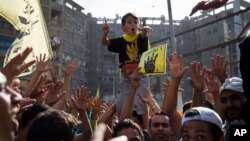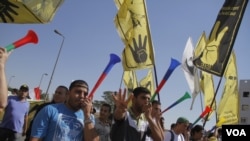CAIRO —
Police fired teargas in Egypt's coastal city of Alexandria on Friday to break up clashes between opponents and supporters of ousted Islamist President Mohamed Morsi, security sources said.
Egypt has been thrown into turmoil by the military's ouster of Morsi on July 3 following mass protests against his rule, a move that prompted his Muslim Brotherhood movement to organise daily demonstrations in cities across the country.
Thousands of Morsi's supporters protested on Friday in the capital Cairo, the second biggest city of Alexandria and other coastal and Nile Delta towns, the security sources said.
"Clashes erupted in Alexandria between pro-Morsi protesters and residents who oppose Morsi," said one of the sources, who asked not to be identified.
"They were annoyed by the protest that included anti-army chants, and it led to security forces firing teargas to disperse the crowds," he added.
Smaller clashes also broke out in the Nile Delta province of Sharqia and the coastal city of Damietta, where one Mursi supporter was injured.
On Aug. 14, Egyptian security forces broke up the two main pro-Mursi sit-ins in Cairo and killed hundreds of civilians.
The army-backed government then declared a state of emergency and imposed a curfew. Thousands of Brotherhood members, including Mursi himself, have been arrested.
Around 57 people were killed in clashes between Morsi's supporters and opponents last Sunday, one of the bloodiest days since the army seized power.
While the military intervention has the support of most Egyptians, the international community, and many Islamists in Egypt, have looked on with alarm as the army and police crack down hard on Morsi and his backers.
The United States, an ally of Egypt that has long supported its military with cash and equipment, said on Wednesday it would withhold deliveries of tanks, fighter aircraft, helicopters and missiles to Cairo, as well as $260 million in aid.
U.S. Secretary of State John Kerry had said Washington would consider resuming some of the aid "on a basis of performance" as the interim government seeks to implement a "road map" designed to lead the country to fresh elections next year.
Egypt criticised the decision, saying it found it strange at a time when the country was "facing a war against terrorism."
However, the U.S. State Department said it would continue military support for counter terrorism and security in the Sinai Peninsula, which borders U.S. ally Israel.
Egypt has been fighting an Islamist insurgency in the largely lawless region, which is also near the Palestinian Gaza strip. Sinai-based militants have intensified their attacks on military and police units since Mursi's ouster.
Six soldiers were wounded on Friday when a bomb exploded near army vehicles in Rafah city, northern Sinai, according to state media. Around 150 security personnel have died in Sinai's insurgency since Morsi was toppled, according to an army source.
Egypt has been thrown into turmoil by the military's ouster of Morsi on July 3 following mass protests against his rule, a move that prompted his Muslim Brotherhood movement to organise daily demonstrations in cities across the country.
Thousands of Morsi's supporters protested on Friday in the capital Cairo, the second biggest city of Alexandria and other coastal and Nile Delta towns, the security sources said.
"Clashes erupted in Alexandria between pro-Morsi protesters and residents who oppose Morsi," said one of the sources, who asked not to be identified.
"They were annoyed by the protest that included anti-army chants, and it led to security forces firing teargas to disperse the crowds," he added.
Smaller clashes also broke out in the Nile Delta province of Sharqia and the coastal city of Damietta, where one Mursi supporter was injured.
On Aug. 14, Egyptian security forces broke up the two main pro-Mursi sit-ins in Cairo and killed hundreds of civilians.
The army-backed government then declared a state of emergency and imposed a curfew. Thousands of Brotherhood members, including Mursi himself, have been arrested.
Around 57 people were killed in clashes between Morsi's supporters and opponents last Sunday, one of the bloodiest days since the army seized power.
While the military intervention has the support of most Egyptians, the international community, and many Islamists in Egypt, have looked on with alarm as the army and police crack down hard on Morsi and his backers.
The United States, an ally of Egypt that has long supported its military with cash and equipment, said on Wednesday it would withhold deliveries of tanks, fighter aircraft, helicopters and missiles to Cairo, as well as $260 million in aid.
U.S. Secretary of State John Kerry had said Washington would consider resuming some of the aid "on a basis of performance" as the interim government seeks to implement a "road map" designed to lead the country to fresh elections next year.
Egypt criticised the decision, saying it found it strange at a time when the country was "facing a war against terrorism."
However, the U.S. State Department said it would continue military support for counter terrorism and security in the Sinai Peninsula, which borders U.S. ally Israel.
Egypt has been fighting an Islamist insurgency in the largely lawless region, which is also near the Palestinian Gaza strip. Sinai-based militants have intensified their attacks on military and police units since Mursi's ouster.
Six soldiers were wounded on Friday when a bomb exploded near army vehicles in Rafah city, northern Sinai, according to state media. Around 150 security personnel have died in Sinai's insurgency since Morsi was toppled, according to an army source.






